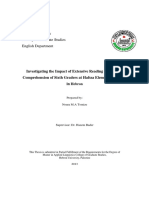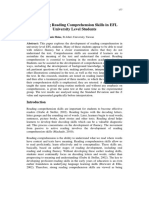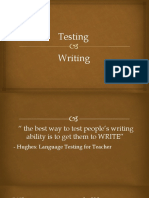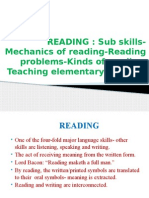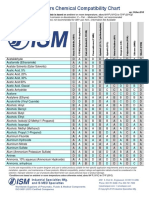Principles For Teaching Reading: 1. Exploit The Reader's Background Knowledge
Uploaded by
popowani13Principles For Teaching Reading: 1. Exploit The Reader's Background Knowledge
Uploaded by
popowani133.
Principles for teaching reading
1. Exploit the readers background knowledge.
A readers background knowledge can influence reading comprehension (Carrell, 1983, Carrell and Connor, 1991). Background knowledge includes all of the experiences that a reader brings to a text: life experiences, educational experiences, knowledge of how texts can be organized rhetorically, knowledge of how ones first language works, knowledge of how the second language works, and cultural background and knowledge. Reading comprehension can be significantly enhanced if background knowledge can be activated by setting goals, asking questions, making predictions, teaching text structure, and so on. If students are reading on an unfamiliar topic, you may need to begin the reading process by building up background knowledge. An interesting concept to consider related to the role of background knowledge is the negative influence it may have. Incorrect background knowledge can hinder comprehension. For example, some readers may have misconceptions about how AIDS is contracted. Some may believe that you can get AIDS by kissing or swimming in a pool. These misconceptions may interfere with a reading passage on AIDS, and you may have to correct the background knowledge through a prereading activity before reading comprehension can be achieved.
2. Build a strong vocabulary base.
Recent research emphasized the importance of vocabulary to successful reading. (See Nation, Chapter 7, this volume.) As I have developed my own philosophy of the role of vocabulary in reading instruction, I have decided that basic vocabulary should be explicitly taught and L2 readers should be taught to use context to effectively guess the meanings of less frequent vocabulary. I have arrived at my philosophy, in part, by reviewing the research on vocabulary acquisition. Levine and Reves (1990) have found that it is easier for the reader of academic texts to cope with special terminology than with general vocabulary (p. 37). They stress the great need for a teaching program that builds general, basic vocabulary. I have found my own vocabulary instruction enhanced by asking these three questions from Nation (1990, p. 4): 1. What vocabulary do my learners need to know? 2. How will they learn this vocabulary? 3. How can I best test to see what they need to know and what they now know?
74
Chapter 4
3. Teach for comprehension.
In many reading instruction programs, more emphasis and time may be placed on testing reading comprehension than on teaching readers how to comprehend. Monitoring comprehension is essential to successful reading. Part of that monitoring process includes verifying that the predictions being made are correct and checking that the reader is making the necessary adjustments when meaning is not obtained. Cognition can be defined as thinking. Metacognition can be defined as thinking about our thinking. In order to teach for comprehension, it is my belief that readers must monitor their comprehension processes and be able to discuss with the teacher and/or fellow readers what strategies they use to comprehend. By doing this, the readers use both their cognitive and metacognitive skills. Questioning the author, developed by Beck, McKeown, Hamilton, and Kucan (1997), is an excellent technique for engaging students in meaningful cognitive and metacognitive interactions with text and for assisting students in the process of constructing meaning from text. Beck et al. emphasize that this activity is to be done during the reading process, not after reading. The approach requires that the teacher model the reading behavior of asking questions in order to make sense of what is being read. Students learn to engage with meaning and develop ideas rather than retrieve information from the text. This particular technique is the kind of activity that teachers of reading should engage the class in, rather than asking them to read a passage and then testing reading comprehension of the material. Use of this approach engages the teacher and readers in queries about the text as the material is being read. Examples of queries include What is the author trying to say here? What is the authors message? What is the author talking about? What does the author mean here? Does the author explain this clearly? (Beck et al., 1997, pp. 34, 37).
Reading
75
4. Work on increasing reading rate.
One great difficulty in the second language reading classroom is that even when language learners can read, much of their reading is not fluent. Often, in our efforts to assist students in increasing their reading rate, teachers overemphasize accuracy which impedes fluency. The teacher must work towards finding a balance between assisting students to improve their reading rate and developing reading comprehension skills. It is very important to understand that the focus is not to develop speed readers, but fluent readers. I define a fluent reader as one who reads at a rate of 200 words-per-minute with at least 70 percent comprehension. One focus here is to teach readers to reduce their dependence on a dictionary. Skills such as scanning, skimming, predicting, and identifying main ideas get students to approach reading in different ways. Readers should spend more time analyzing and synthesizing the content of the reading, and not focusing on moving through the passage one word at a time. Part of the joy of reading is being able to pick up a book and comprehend it, without having to struggle through the task of reading.
5. Teach reading strategies.
Strategies are the tools for active, self-directed involvement that is necessary for developing communicative ability. Strategies are not a single event, but rather a creative sequence of events that learners actively use (Oxford, 1996). This definition underscores the active role that readers take in strategic reading. To achieve the desired results, students need to learn how to use a range of reading strategies that match their purposes for reading. Teaching them how to do this should be a prime consideration in the reading classroom (Anderson, 1991; Chamot and OMalley, 1994). Some of the research that I have done indicates that there is no single set of processing strategies that significantly contributes to success in second language reading tasks. Strategic reading means not only knowing what strategy to use, but knowing how to use and integrate a range of strategies (Anderson, 1991). A good technique to sensitize students to the strategies they use is to get them to verbalize (or talk about) their thought processes as they read. Readers can listen to the verbal report of another reader who has just read the same material, and it is often revealing to hear what other readers have done to get meaning from a passage. I use this technique in my reading classes to get students to become more aware of their reading strategies and to be able to describe what those strategies are.
76
Chapter 4
6. Encourage readers to transform strategies into skills.
An important distinction can be made between strategies and skills (Kawai, Oxford, and Iran-Nejad, 2000). Strategies can be defined as conscious actions that learners take to achieve desired goals or objectives, while a skill is a strategy that has become automatic. This characterization underscores the active role that readers play in strategic reading. As learners consciously learn and practice specific reading strategies, the strategies move from conscious to unconscious; from strategy to skill. For example, guessing the meaning of unknown vocabulary from context can be listed as both a strategy and a skill in reading texts. When a reader is first introduced to this concept and is practicing how to use context to guess the meaning of unfamiliar vocabulary he or she is using a strategy. The use of the strategy is conscious during the learning and practice stages. As the ability to guess unfamiliar vocabulary from context becomes automatic, the reader moves from using a conscious strategy to using an unconscious skill. The use of the skill takes place outside the direct consciousness of the reader. The goal for explicit strategy instruction is to move readers from conscious control of reading strategies to unconscious use of reading skills.
7. Build assessment and evaluation into your teaching.
Assessing growth and development in reading skills from both a formal and an informal perspective requires time and training. Both quantitative and qualitative assessment activities should be included in the reading classroom. Quantitative assessment will include information from reading comprehension tests as well as reading rate data. Qualitative information can include reading journal responses, reading interest surveys, and responses to reading strategy checklists. (See Brindley, Chapter 15, this volume.)
8. Strive for continuous improvement as a reading teacher.
The quality of the individual teacher is integral to success of second/foreign language readers. Reading teachers need to be passionate about their work. They should view themselves as facilitators, helping each reader discover what works best. Integrating the key principles discussed above can lead to more effective reading instruction in the second language classroom. While research studies conducted as early as the 1960s failed to support a single approach to teaching reading as better than others, it did support the central role of the teacher in students success in learning to read (Farstrup, 2002). The good reading teacher actively teaches students what to do. To succeed, you need more than classroom tips and techniques: you need to understand the nature of the
Reading
77
reading process (Anders, Hoffman, and Duffy, 2000). The International Reading Association gathers input from reading educators around the world each year on what the hot topics are in reading. For 2002 a hot topic that appeared on the list for the first time was teacher education for reading (Cassidy and Cassidy, 2002). Just because you are a reader does not mean that you are prepared to be a teacher of reading. Aebersold and Field (1997) have entitled their text for teacher education in reading, From Reader to Reading Teacher. What a nice title for each of us as we seek to improve our ability to teach reading!
Reflection
1. Which of the principles mentioned in Section 3 are you the most familiar with already? Which are you least familiar with? 2. What is the difference between the terms strategies and skills? 3. Why does the teacher play such a central role to the success in a reading classroom?
Action
78
1. Are you aware of a reading passage with which readers may have misconceptions in their background knowledge that would need to be corrected prior to reading? Describe the passage and why readers may have incorrect schemata. 2. Select an appropriate reading passage and practice the technique of questioning the author on page 75. What do you learn about your own comprehension processes as you read? 3. Read for five minutes and estimate your reading rate. What do you learn about your own rate from this activity?
Chapter 4
You might also like
- Exploit The Reader's Background KnowledgeNo ratings yetExploit The Reader's Background Knowledge4 pages
- Teaching Reading Skills Through CompreheNo ratings yetTeaching Reading Skills Through Comprehe11 pages
- A Study On Reading Strategies Used by Vietnamese HNo ratings yetA Study On Reading Strategies Used by Vietnamese H9 pages
- The Effect of PQRST Method On The StudentNo ratings yetThe Effect of PQRST Method On The Student30 pages
- Investigating The Impact of Extensive Reading On ReadingNo ratings yetInvestigating The Impact of Extensive Reading On Reading210 pages
- Reading Comprenhension Strategies ScrivenerNo ratings yetReading Comprenhension Strategies Scrivener65 pages
- Approaches, Methods, Procedures and TechniquesNo ratings yetApproaches, Methods, Procedures and Techniques9 pages
- Introduction To Language and LinguisticsNo ratings yetIntroduction To Language and Linguistics33 pages
- Improving Students' Reading Skill Through Communicative Language Teaching Method Chapter IINo ratings yetImproving Students' Reading Skill Through Communicative Language Teaching Method Chapter II16 pages
- Review - Teaching Second Language ReadingNo ratings yetReview - Teaching Second Language Reading3 pages
- Games As Strategies in Teaching Reading-Dr AlbaceteNo ratings yetGames As Strategies in Teaching Reading-Dr Albacete58 pages
- Immediate download Handbook of Research in Second Language Teaching and Learning Volume III ESL Applied Linguistics Professional Series 1st Edition Hinkel ebooks 2024100% (1)Immediate download Handbook of Research in Second Language Teaching and Learning Volume III ESL Applied Linguistics Professional Series 1st Edition Hinkel ebooks 202455 pages
- English Language Teaching Principles Practice (ELT/PP Year II) - Module IINo ratings yetEnglish Language Teaching Principles Practice (ELT/PP Year II) - Module II90 pages
- The Role of Extrovert and Introvert Personality in Second Language AcquisitionNo ratings yetThe Role of Extrovert and Introvert Personality in Second Language Acquisition6 pages
- Towards Acquiring Communicative Competence Through Writing67% (3)Towards Acquiring Communicative Competence Through Writing27 pages
- Wk1 - Approaches To Teach Reading Week 1 25th June 2018100% (1)Wk1 - Approaches To Teach Reading Week 1 25th June 201824 pages
- Unit 2. Basic Principles of Teaching To Young LearnersNo ratings yetUnit 2. Basic Principles of Teaching To Young Learners1 page
- Content-Based Instruction.: Deswita Rahmadani Novi Wulandari Merianti ArdillaNo ratings yetContent-Based Instruction.: Deswita Rahmadani Novi Wulandari Merianti Ardilla18 pages
- Final Teaching Methodology VB2 Thang 11 2021100% (1)Final Teaching Methodology VB2 Thang 11 20214 pages
- Inductive and Deductive Methods of Teaching GrammarNo ratings yetInductive and Deductive Methods of Teaching Grammar4 pages
- Language Teaching Appreciation: Reading Approaches and StrategiesNo ratings yetLanguage Teaching Appreciation: Reading Approaches and Strategies4 pages
- Considerations and Techniques For Applied Linguistics and Language Education ResearchNo ratings yetConsiderations and Techniques For Applied Linguistics and Language Education Research259 pages
- Bản Sao Của Discourse Analysis & Intercultural CommunicationNo ratings yetBản Sao Của Discourse Analysis & Intercultural Communication171 pages
- Guidelines For Designing Effective English Language Teaching Materials-HowardNo ratings yetGuidelines For Designing Effective English Language Teaching Materials-Howard9 pages
- Motivation and Its Role On Language AcquisitionNo ratings yetMotivation and Its Role On Language Acquisition27 pages
- Four Main Characteristics of An Effective English Language TeacherNo ratings yetFour Main Characteristics of An Effective English Language Teacher5 pages
- The Effect of Think Aloud Strategy Toward Students Reading SkillNo ratings yetThe Effect of Think Aloud Strategy Toward Students Reading Skill16 pages
- Perhatian..: Perhentian Setia Travel & Tours SDN BHDNo ratings yetPerhatian..: Perhentian Setia Travel & Tours SDN BHD1 page
- Find Study Materials of English Language, Literature and ELTNo ratings yetFind Study Materials of English Language, Literature and ELT4 pages
- Montague Blacksmith Supply 2009 CatalogNo ratings yetMontague Blacksmith Supply 2009 Catalog46 pages
- Vox Pops Video Worksheets Teacher's NotesNo ratings yetVox Pops Video Worksheets Teacher's Notes3 pages
- Sample Weber Health Assessment Nursing 7th100% (1)Sample Weber Health Assessment Nursing 7th30 pages
- GR 9 Final Assessment Datesheet and SyllabusNo ratings yetGR 9 Final Assessment Datesheet and Syllabus7 pages
- FINAL Work Experience Sheet - ENGR. FAROUK NINOY A. BASILANNo ratings yetFINAL Work Experience Sheet - ENGR. FAROUK NINOY A. BASILAN4 pages
- Adi Shankara Got Into An Argument With A Man and WonNo ratings yetAdi Shankara Got Into An Argument With A Man and Won2 pages
- Mechanical Liquid Flow Switch: Penn Commercial RefrigerationNo ratings yetMechanical Liquid Flow Switch: Penn Commercial Refrigeration2 pages
- The Goodness of Garlic: (Stabilized Allicin)No ratings yetThe Goodness of Garlic: (Stabilized Allicin)4 pages
- A Study On Reading Strategies Used by Vietnamese HA Study On Reading Strategies Used by Vietnamese H
- Investigating The Impact of Extensive Reading On ReadingInvestigating The Impact of Extensive Reading On Reading
- Improving Students' Reading Skill Through Communicative Language Teaching Method Chapter IIImproving Students' Reading Skill Through Communicative Language Teaching Method Chapter II
- Games As Strategies in Teaching Reading-Dr AlbaceteGames As Strategies in Teaching Reading-Dr Albacete
- Immediate download Handbook of Research in Second Language Teaching and Learning Volume III ESL Applied Linguistics Professional Series 1st Edition Hinkel ebooks 2024Immediate download Handbook of Research in Second Language Teaching and Learning Volume III ESL Applied Linguistics Professional Series 1st Edition Hinkel ebooks 2024
- English Language Teaching Principles Practice (ELT/PP Year II) - Module IIEnglish Language Teaching Principles Practice (ELT/PP Year II) - Module II
- The Role of Extrovert and Introvert Personality in Second Language AcquisitionThe Role of Extrovert and Introvert Personality in Second Language Acquisition
- Towards Acquiring Communicative Competence Through WritingTowards Acquiring Communicative Competence Through Writing
- Wk1 - Approaches To Teach Reading Week 1 25th June 2018Wk1 - Approaches To Teach Reading Week 1 25th June 2018
- Unit 2. Basic Principles of Teaching To Young LearnersUnit 2. Basic Principles of Teaching To Young Learners
- Content-Based Instruction.: Deswita Rahmadani Novi Wulandari Merianti ArdillaContent-Based Instruction.: Deswita Rahmadani Novi Wulandari Merianti Ardilla
- Inductive and Deductive Methods of Teaching GrammarInductive and Deductive Methods of Teaching Grammar
- Language Teaching Appreciation: Reading Approaches and StrategiesLanguage Teaching Appreciation: Reading Approaches and Strategies
- Considerations and Techniques For Applied Linguistics and Language Education ResearchConsiderations and Techniques For Applied Linguistics and Language Education Research
- Bản Sao Của Discourse Analysis & Intercultural CommunicationBản Sao Của Discourse Analysis & Intercultural Communication
- Guidelines For Designing Effective English Language Teaching Materials-HowardGuidelines For Designing Effective English Language Teaching Materials-Howard
- Four Main Characteristics of An Effective English Language TeacherFour Main Characteristics of An Effective English Language Teacher
- The Effect of Think Aloud Strategy Toward Students Reading SkillThe Effect of Think Aloud Strategy Toward Students Reading Skill
- Perhatian..: Perhentian Setia Travel & Tours SDN BHDPerhatian..: Perhentian Setia Travel & Tours SDN BHD
- Find Study Materials of English Language, Literature and ELTFind Study Materials of English Language, Literature and ELT
- FINAL Work Experience Sheet - ENGR. FAROUK NINOY A. BASILANFINAL Work Experience Sheet - ENGR. FAROUK NINOY A. BASILAN
- Adi Shankara Got Into An Argument With A Man and WonAdi Shankara Got Into An Argument With A Man and Won
- Mechanical Liquid Flow Switch: Penn Commercial RefrigerationMechanical Liquid Flow Switch: Penn Commercial Refrigeration










